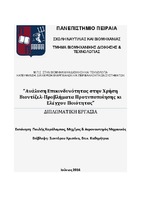Ανάλυση επικινδυνότητας στην χρήση βιοντίζελ - προβλήματα προτυποποίησης κι ελέγχου ποιότητας

View/
Keywords
Βιοκαύσιμα ; Περιβαλλοντικές επιπτώσεις ; Βιοντίζελ ; Προτυποποίηση ; Ποιότητα ; ΕνέργειαAbstract
The growing concern about both the environmental consequences arising from the
extensive use of fossil fuels and the total dependency of the industry sector and the modern
lifestyle on fossil fuel reserves, has led towards the development of alternative fuels, and
especially biofuels. Biodiesel, or as it is else known the methylesters of fatty acids (FAME)
constitutes nowadays the most widely used biofuel on a global scale, and it may be used in it’s
pure form or mixed with conventional diesel to serve the needs of the transport and energy
production sector. To further promote biodiesel however, and for it’s establishment on the
market as a product-subtitude of conventional fossil diesel, the realization of appropriate quality
standards and assurance systems is additionally required. By prescribing specific thresholds
regarding the quality and performance of the fuel, these mechanisms will definitely contribute on
an increasing consumer confidence and will enhance the product’s market acceptance.
This MSc thesis focuses on highlighting both the weakness and inadequacy of current
biodiesel quality standards, which in their majority were originally developed for conventional
diesel, for implementation to biodiesel. In summary, this work covers the following topics:
Chapter 1 lists some important introductory and historical data on biofuels and on biodiesel in
particular, including the existing legislative framework, the development phases of biofuels and
the different types of energy crops. In Chapter 2, which is the product of an extensive literature
research, the reader is provided with information related with the strong dependence between
biodiesel’s quality and properties and the heterogeneity of the feedstock which is used for the
production of the biofuel (energy crops). In Chapter 3, the two most widely used biodiesel
quality standards, which are namely the European EN 14214 and the American ASTM D6751,
are meticulously recorded and analyzed, while the argumentation against their relevance and fitness is gradually deployed in the following Chapter 4. Chapter 5 briefly presents the current
trends – guidelines for the development of advanced appropriate quality standards,
methodologies and measuring practices for biodiesel characterization, while finally in Chapter 6,
the conclusions drawn from this work are summarized.


